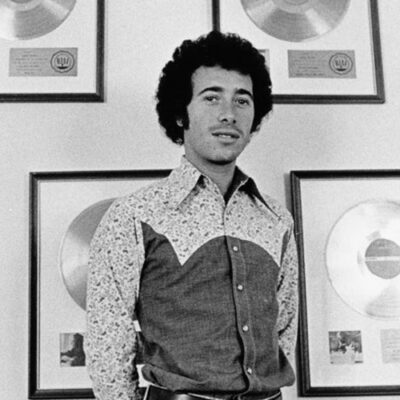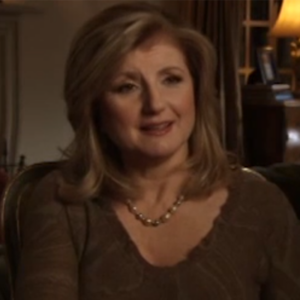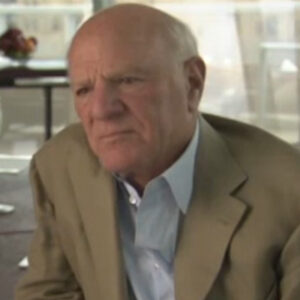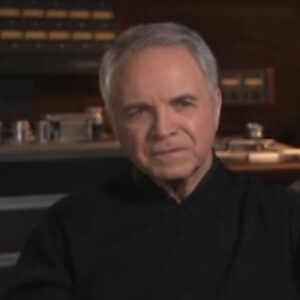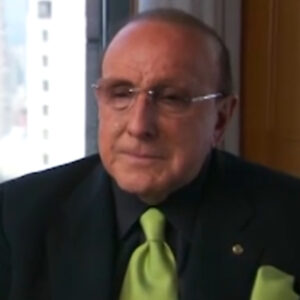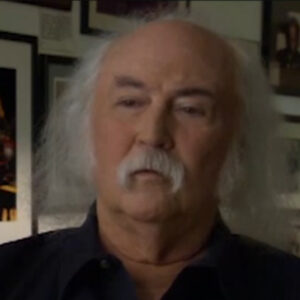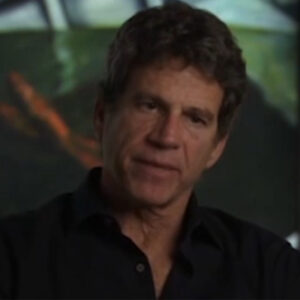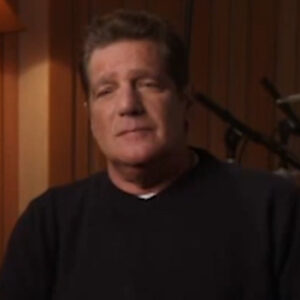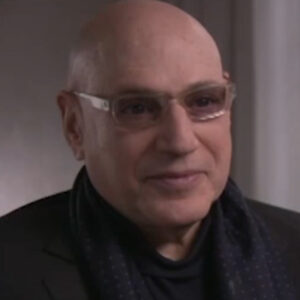Speaker The entire industry really came out for a Clive’s dinner because it was in honor of David Geffen. That goes for me because I wouldn’t have gone to his dinner if it didn’t involve an honor for David Geffen.
Speaker Could you say that? Can you just add that that was that’s unusual. That didn’t always happen.
Speaker Yeah. Clive Davis dinner usually was a self-serving, grandiose event about Clive Davis.
Speaker So in honoring David Geffen was quite an unusual event.
Speaker You don’t like Clive Davis very much.
Speaker I I think Clive Davis is an innovator and a great record man.
Speaker But, you know, compared to other great executives such as Ahmet Ertegun and David Geffen, you know, he’s far he’s a bigger self promoter.
Speaker He’s a bigger egomaniac.
Speaker And I it’s hard to really you know, I guess I I have been disappointed by Clive Davis, his behavior in relation to other people over the years.
Speaker I just think I knew all that quite well. They feel that. All right. Did you see it? Yeah, I then I thought it was good. It became really good friends. I still see me. I just go for dinner last week. But you work for it. I work. I work.
Speaker I work for it for seven years. I was particularly interested that Atlantic made sure I wasn’t interviewed for a four year film because I signed Foreigner and AC DC as well.
Speaker So friendly with Phil Carson. Phil Carson taught me a lot about the record business, but he conspicuously left me out of it.
Speaker Well, that’s interesting because. I work very closely with him.
Speaker Yeah, he’s he was he’s a great guy and really helped me a lot.
Speaker We did he didn’t decide who was being interviewed, but we did a lot in terms of his suggestions. So why do you think it’s totally off point the way you think and what you write?
Speaker Because I think that it diminishes importance.
Speaker If I was interviewed and he was a very he was a very important person who taught me a lot about how to work with artists and handle artists.
Speaker So I thought it was particularly strange.
Speaker And he didn’t include me as well that I still see. Yeah, for sure. Yeah.
Speaker Yeah.
Speaker I mean, he he is a very important person to me.
Speaker So I, I just you know, these are these kind of things, you know, if you’re involved in the music business, you know, you get hurt so much by the artist.
Speaker By the time Phil Carson or somebody gets around to hurting their feelings, it’s nothing.
Speaker So that’s just how it goes. I think David’s experience that quite a bit. I think so, too. So let’s go back to the beginning. And did you meet David when you were working for him?
Speaker I never met David Geffen when I was working for him. And he was kind of a very legendary figure to me because of I knew about his manager and Laura Nyro, who was one of my favorite artists when I was when I was young, and his starting asylum records that I loved all the artists on asylum records.
Speaker I also knew he was a manager and so I knew of him.
Speaker I wrote a lot of things about him for Atlantic Records, for press releases, but I never met him ever.
Speaker So how did you meet how did you come together when he was starting his company in the summer of 1980?
Speaker He I, I think either in the Latin Guard or himself called me to come over to his house on Angelo Drive to talk to him about working for him. And that’s the first time I ever met him.
Speaker Why do you think he called you? What did he know about you that attracted you to him?
Speaker Well, David Geffen is one of the most instinctual people I know about talent and about people who are talented and who he has a great sense of timing of people’s careers. And he knew it was about to be my time. And then I was talented. And so I think that’s one of the reasons he wanted to meet me and have me work at his company.
Speaker So.
Speaker What did you what about his legacy at asylum, besides the fact that you love the artist? What about his particular legacy with that in particular? Did you come away with thinking about him in terms of what he was doing in the music business at that time?
Speaker Well, I knew David Geffen was a very strong force to his artists and to the label, but I wasn’t that clear on exactly what it was, because by the time I had any influence at Atlantic Records, he had sort of left the music business. So there were just different stories about him. And they were they were conflicting and confusing.
Speaker So I just know that he ran a company and signed artists that were very important to me. And I didn’t know much about his personal style or history or anything, really.
Speaker What were some of these conflicting and confusing things?
Speaker People would say that he was very close to the artists.
Speaker He was very artist friendly. But they would also say he was very, you know, temperamental with with his company. I’m not so sure the artist I didn’t really hear much about that, but he that he can be very volatile. So that’s really I didn’t really have much information about about him. I just knew that he was very important in terms of signing and developing artists that I thought were great and who were very important.
Speaker So what was the buzz in the industry about Geffen Records when you when it got started?
Speaker There was a buzz in the industry about David Geffen coming back. I think that people were interested, excited and maybe skeptical. I had a lot of different conflicting opinions about it, but it didn’t matter because if I had the opportunity to work for David Geffen, I would have left any job and done anything to go to work for him.
Speaker Why would there have been skepticism? He’d been very successful at the site.
Speaker I have no idea. Maybe because he was he laughed and he was away for a while and people didn’t know. And it was a huge growth in the music business. I’m not really sure because it didn’t matter to me. It didn’t matter to me because he was an important figure to me. And then I had the rare opportunity to to go to work for him.
Speaker So that was what was important to me. Nothing else was important. It didn’t really matter what anyone else said. I mean, believe me, I’m a nerd again. And Sheldon Vogul were quite unhappy when I left Atlantic Records to go work for David Geffen.
Speaker Did Albert ever talk to you that day?
Speaker No.
Speaker He just told me how stupid I was and you know, how I was ruining my career by leaving Atlantic Records. And then he sent me to Sheldon Vulval, who was the executive vice president and sort of ran the company, was the principal of the principal, like in high school.
Speaker And then they tell me how unhappy they were. Then I did this and they just like something from a great movie. They took me down to the lobby. They took my I.D. card and they they escorted me out to Fifty Second Street just like a movie. And I was standing there just that that was it said I said I said, Thomaston, don’t you want me to finish a survivor record and all these records I’m working on? And he said, Now you’re done. But that’s really Godfather kind of stuff and really what it really was, I mean, I thought that really only happened in the movies. And the funny thing is, is that I have started in that building at 75 Rock in early 1974. So the security guys and all the people in Haversack escort me out. I knew all of them. So it was a very surrealistic scene.
Speaker But you weren’t the least bit hesitant about it. You you were hitching your story to David, and that was it, right?
Speaker I had absolutely no hesitation about leaving Atlantic and going to work for David Geffen. None. I didn’t know. Zero percent concern or hesitation.
Speaker So describe the early days at Geffen Records, what signing said he’d already done by the time you came in.
Speaker I think the only signings maybe he had done because I was there from pretty much the first of August.
Speaker So I think maybe Donna Summer and Elton John.
Speaker And then during that time, he was developing the relationship with Yoko, I guess, to sign John Lennon.
Speaker Did you see how Lennon feel that way now? And I’ll think about, OK, that was just on the November Lennon NYC.
Speaker See?
Speaker Yeah. Became very friendly with Yoko. I think I think I might have seen a good deal. Yeah.
Speaker So he. So what was David’s thinking? I mean, clearly what do you think was guiding him and his choices of those artists at that time when he was starting a company?
Speaker I think his I think his philosophy was he wanted to start a company that would have an instant name and instant appeal and instant credibility. But I don’t really know beyond that, because why he hired me was it was my job to bring in the artists of the future, because he told me, unlike an asylum, he knew that his time in signing artist was probably at the end and he felt that mine was at the beginning and he was right.
Speaker Some of those, which, of course, is part of his genius, that he actually knew that.
Speaker Yes.
Speaker I mean, he he he he is a genius because there’s very few people in the world who would realize the fact that they were evolving into something else, meaning he was evolving from a great record executive and talent scout into a record executive who ran a company that he planned to be big. But he realized that his being in touch with the music of of the 80s was probably not his strong suit at the time. At least, you know, over the years he would tell me that.
Speaker Let’s talk a little bit about sort of the ebbs and flows of the company at the beginning and then including the fact that that I think he paid some very large upfront payments to some of these large artists. And and then they did some of those early ones. Donna didn’t quite pan out completely. And didn’t that create some difficulties for the company? The beginning just kind of given ebb and flow of what happened at the beginning there?
Speaker Well, what happened at the beginning was he had hired Carol Childs and myself to do it. And ah, as long as well as Andy Rosenblatt, who was at Warner Brothers Records, who was the distributor of Geffen Records. And so the purpose that Carole Childs and I had was to really work on signing new artists to the company. So I did not pay that much attention, nor was I asked to pay any attention to David Signing’s. I was totally focused on what I wanted to do and what my artists could produce or not produce. One of the great things about David Geffen is that he when he hired somebody, he allowed the person, meaning myself, to do what I wanted to do. And you either.
Speaker Or failed, so you worked. Did he talk to you about his worries, his concerns? I mean, when did the Donna Summer sort of go or summer rather go become a born again after that? And so his expectation of what she was going to produce didn’t materialize. And even Elton said that he wasn’t ready, particularly great songs at that time.
Speaker So I only mention this because there was a huge then huge surge in the success of Geffen Records that did get off to a slow start. Isn’t that true?
Speaker Yes. And got off to kind of and had a very like you said, it had an ebb and flow star. But again, you see, my my job was I was focused on what I was signing and the kind of records that they were going to make. So the first person I signed was Sammy Hagar.
Speaker And then I went on to sign some different things. And obviously I put together Asia. And so they became successes for the company and that that was my job.
Speaker There wasn’t really any discussion about with me about Donna Summer or Elton John, because that was really not what my job was.
Speaker So what was your interaction with David when you can do this? I gather then it was like I really sat around and had meetings and said, OK, this is work and that isn’t working. We have to do this. We have to. Everybody was just in their own little silos and you had no sense of what his expectations were or frustrations or disappointments or happiness or what.
Speaker Well, David Geffen was the ultimate greatest boss for any creative person because there were no meetings, there were no stupid, you know, criticism, comments. He he allowed you to do what you wanted. And any Rosenblatt was a person who coordinated the activities within the company. And when there was an overall problem or esoteric or cultural question, I might ask him. But the day to day things about signing artists he really didn’t wasn’t involved with on my area, he might have been with any Rosenblatt or Eric Eisner later on, but I pretty much got to do exactly what I wanted to.
Speaker So what are some of your memories of of dealing with interacting with David at that time? I mean, when you what are some of your memories, your best memories of saying, hey, I’m really excited about this band. I heard I really want to do this? And just what was your interaction? How did that work? I understand that he left you to your own devices and he trusted you. He trusted your ear and he encouraged cingulate.
Speaker Your vision had some interaction with it.
Speaker Yes, I had that interaction with him. I when he when I would sometimes see him and he would say when his opinion was about something, an artist or whatever, but it wasn’t it was very like going to somebody who you would look up to or who who was very successful and who also would say, I don’t really know about the music that you’re working on, so I’m here to support you and get you what you want. He was like the mentor or somebody who who allowed you to do things.
Speaker So what are some of the other big signings that you did besides put Asia together?
Speaker Well, I had a lot of big signing to Geffen Records. I mean, after Asia, I signed Aerosmith, which shows how incredible David Geffen was because the lawyer for Aerosmith was a guy named Brian Rohan, who David Geffen hated, who I think the story was, and he tried to punch David Geffen and the Clive Davis party years before.
Speaker I don’t know whether that’s true or not, but he was not a fan of Brian Rowland, but he made sure the deal happened. And that is what that’s the part he played in my life in signing people. He made sure things happened like Clive Davis was trying to ruin Aerosmith the off the last minute and David Geffen did not let that happen.
Speaker So that’s. He played I sign Whitesnake, I signed Cher, I signed, you know, all these million bands who had quite good success, Wanxiang Madness, all of the many British bands you see, he you know, he allowed me pretty much full range of the entire scope that I had. And he pretty much left things alone. If he felt that, you know, an act wasn’t doing well, he would say, you know, you better deliver on this next record. That would be his comment.
Speaker So I’m not going to talk to you that Don Henley, because I wish I knew more about that. That’s why this difficult was I don’t know.
Speaker It’s funny because I don’t know much about Don Henley either, except, you know, I know that he loved Don Handley’s music. It’s the only time that I ever had that position and something to do with Don Henley. I had no idea why I was doing in that position. And that’s how bizarre it was, because I didn’t know anything about it.
Speaker Well, they had a very difficult passage, asylum.
Speaker Yes, of course, because, I mean, he he is the person who put the goals together. So, yes, obviously.
Speaker And he retained their publisher.
Speaker Yes. As far as that’s when I heard.
Speaker So given that, is it surprising to you that Don Henley signed with Geffen Records?
Speaker I mean, I don’t I don’t know a great answer that question only because David Geffen thought Don Henley was one of the great artists in the world.
Speaker So that’s really what I heard, you know, from my end. But remember, I mostly spoke to David Geffen about music or what he thought, you know, was something that I should do or not do. So there’s only, you know, he I had free reign for 15 years when I worked for him. And there’s only two artists he didn’t let me sign ever.
Speaker Who were that curious?
Speaker Ozzie Osborne, who I really wanted to sign, but he had had bad dealings or he felt I don’t know if he had a bad deal and he might have felt not not good about Ozzy’s manager, who was Dunaden at the time, who was Sharon’s father, who I don’t think had a very good reputation.
Speaker And he just the word came down.
Speaker He didn’t want me to sign Ozzy Osborne. And so that was the end of the story because I had never heard that from him. And before really pretty much after that.
Speaker What what what point did David decide that he should bring in some other guy’s?
Speaker I think, yes, I suggested that, you know, Carol Childs and I were or in Afghanistan and I felt that there are some good people out there who Geffen should hire. And he was very he was always receptive. So that was like a talent idea. You know, I gave him some names, Gary Gurche and Thomas Etat, who he did hire.
Speaker And it was one of those things where he he used my knowledge as a talent scout instead of kind of business thing, because I was trying to pick people who would also sign other acts that were good.
Speaker Tom Toms, who said that David learned to Aidar and our guys would. How would you characterize that?
Speaker David Geffen was a genius in many things, but he had the ability once he had his three and a half stars to segregate each one to their own sort of company within a company and then pit us against each other to see which one could do better. And that was so it was maybe an hour and an hour, guys, maybe he was making and our guys competing as business people within his own company. But he was able to do something that no one else ever did for since he had the three strongest and our people ever and a record company.
Speaker And how did you differ from each other in in every single way?
Speaker We differed in every single way.
Speaker You so start that again.
Speaker Yeah.
Speaker I mean, the Tomstad Garrincha version nine different and in every single way could differ our styles. Everything about the three of us was different.
Speaker And what were your different areas of specialty in music?
Speaker Well, I was like the person who liked commercial rock music, you know, the most commercial, the Whitesnake, Aerosmith, you know, pop commercial music, Garriga, which was more of a snob, even though he thought he wanted you know, he wanted to have big artists, but he liked to sign the people that would have the critical acclaim from the.
Speaker Rolling Stone magazine and Tom, that I mean, what would would sign things he really liked or thought were great and he was a purist, I think I was not a purist. I wanted to sign the biggest acts in the world. And you did.
Speaker And I did. And then and I went on to work with them as well at Columbia Records, the biggest, you know, even acts. And I couldn’t sign such a journey. But David Geffen really encouraged me to pursue that area of interest. And it’s very unusual for a record. Company owner and had to have you pursue things that aren’t necessarily critically acclaimed.
Speaker What would you.
Speaker What was that? Well, let’s talk a little bit about, you know, anything about David’s getting back the ownership of the full ownership of Geffen from Warner. Do you know that that you talk about that at all? I want to talk about that.
Speaker OK, um.
Speaker It’s an interesting story, Shahraz. Why won’t you talk about it? It’s his business. Uh.
Speaker All right, obviously, can you see I have this attitude because David Geffen Hall next to my father, the most important person in my life. So there are certain things that I would comment on, you know, and obviously I’m edited. But anything that really involves David Geffen’s business or really personal thing that only he should comment on, that’s why I won’t comment on those things. Yeah. David Geffen gave me many gifts, a Range Rover and another car. But bonuses, I mean, incredible things, the exact opposite of any artist that I worked with. I think I think I think I think it’s an interesting story.
Speaker Then, Jessica, bring that because I think she came in to see David David one day just to see him to talk about the upcoming free movie she was going to do. And I said, can I said to Linda Lutton, guard David Geffen’s assistant, can I see her before she leaves? So she she said she’ll she’ll send her to my office. And she came to my office and I said, you know, I always loved your music.
Speaker She said, well, I hate making records. I hate Half-Breed. I hate stuff Garratt. I hate Sonny Bono. You know, he stole from me and controlled me. And thanks to David Geffen, I got out of that and she said, and I don’t really want to sing again. I want to be an actress. I said, well, you know, I think you’re an incredible talent and a star. And I think, you know, the world should be able to hear your music again. And I so I beg to differ. I said if I put a record together where you sing it and she said, I’ll think about it. And then she said then I think she called me our Deb Paul, calling me and she said, yeah, you have one month to record this record. And that’s that was the story of, you know, it was that kind of casual conversation of her sitting on my couch and, you know, just in a very casual way. And that’s how the science fair went down.
Speaker Was David pleased today that that she was reciting together? Records must have been satisfying for him in some way.
Speaker I mean, I don’t allow oh, you didn’t say great job, I’m so glad you got here and right now did not go down that he didn’t say that.
Speaker Now, he encouraged me like he did with all the other artists to make the best record and concentrate as hard as I could to make the best record. And that was his advice. He said that, you know, she needs to have heads. And that’s when I was planning to do.
Speaker What would you describe if you had to sum up from a musical point of view, just stepping back and looking at what were the trends in music that were sort of begun? Geffen Records, how would you characterize it? That was incredibly diverse, which was part of its underlying business strategy.
Speaker Yeah, I mean, Geffen Records was incredibly diverse.
Speaker And that’s why it was so interesting, because as it developed, Geffen allowed all the different influences to be involved in this company with Tom Zentan and Gurche and a few other young and different and our people.
Speaker And I would say, well, we can get this band for the United States like STC. And he would say, OK.
Speaker And he embraced pretty much, you know, all diversity of the trends of the 80s and early 90s in order for his company to be successful. I didn’t really ever have a discussion with him about, like, you know, critical evaluation of the artists because I didn’t care.
Speaker You know, I was a writer when I started before Atlantic Records. And I used to get when I used to write reviews of artists, people used to write me letters.
Speaker And I used to say, I line my birdcage with your reviews. And so that’s what I felt about writers and critics.
Speaker That’s funny.
Speaker So the whole music industry has changed so much between the silent records and get records, can you just talk about that change and how Geffen Records had to be different in order to succeed from the silent, what the silent did so well at the Geffen Records did so well, both run by the same man, entirely different attitude.
Speaker Yeah, I mean, again, because David Geffen probably is the smartest person I ever met for real. He understood the difference between asylum records and his part as a young record executive. And Geffen Records, where he was certainly not all but older and having the ability to figure out what the trends were.
Speaker The 80s were totally different trends and different trends from the beginning to the end, and he didn’t really want to be out with the masses in America. And I reveled in that being with with the audience, the kids who chose it. Sammy Hagar shows and Aerosmith shows and talking to them and asking them and and he he wanted Geffen to be, you know, the biggest record company in the world.
Speaker And that’s totally what I wanted it to be as well. So he he changed his philosophy because why I wanted to work for him was he was he he developed all of these legendary artists, but he was smart enough to see the change in America. You know, Ronald Reagan’s 1980s of everything great and everything successful and everything big. You know, it’s it’s one of those things that even though President Obama, you know, sees the Reagan 80s as what that was, you know, America being the greatest. Well, that’s what that was the concept that I had for Geffen record. And he David Geffen, allowed me to pursue that concept for his company at the same time, probably having other people pursue different concepts for his company. That’s why everyone wanted to be at his company and his record company, because. People could see that he had a lot of different varying input, opinions, influences, and it wasn’t all the same who I interviewed David a while back.
Speaker We talked a little bit about it.
Speaker We talked a lot about what you did talk about, period, like a little bit about the timeline on this, where he said he realized that he had been paying attention to his company and he had he had to go back and pay attention to it.
Speaker Do you remember this period of time where David was a little more absent?
Speaker Absolutely not. That’s because that’s certainly his memory. Yeah.
Speaker And, you know, remember, it’s like I didn’t he was there every single day, but I didn’t interact with him every day. And he was and probably could tell you that or Eric Eisner. But he was always there for me when I needed a question or opinion or if he was unhappy about something, he had told me about it. I mean, he was not he was fairly uncensored.
Speaker And if he didn’t like something so he didn’t talk to you about what was going on inside of him or not.
Speaker I mean, in terms of like my signings and the direction of the company, you know, I I signed Aerosmith and they were still on drugs. And it’s the beginning of, like, dealing with people on drugs. And the manager, Tim Collins, did an intervention. And but David Geffen’s comments were, you know, they made a record.
Speaker They made a crappy record. You better do better next time or they’re out of here.
Speaker So his his commentary was very practical and obviously motivational to I wanted them to be as great as they could be. And Tim Collins, the manager, also listened to to to that opinion and that comment.
Speaker So Geffen Records would be great if you could give this back to me, because my question became the most successful independent record label in history and that was a huge debut because it was kind of a comeback because it did have a very slow start in a film. You’ve got to have a little bit of drama. So you could kind of set that that, you know, when they started Geffen Records, he did not get off to the splash start that everybody hoped. And he had certainly hoped it would, but it turned it around and became the most successful independent record label in history. Great. If you could sum that up and say that for me in your own words, of course.
Speaker Well, I mean, Geffen Records became from a star to, you know, when he left the most successful independent record company ever. And it was really due to his philosophy of always trying your best, always doing your best. He wouldn’t use the talent he used to tell me when I would ask him something. You know, I’m trying to do this with Aerosmith. And he would say, don’t, don’t try, do. And so that’s one of the things I learned about him. So the company.
Speaker People say it got off to a slow start, but every company, if you’re competing against Warner Brothers in Columbia Records, every company is going to have a hard time competing against them. It’s going to take years to build until you have a roster that that had was a powerhouse.
Speaker It could compete against them. I don’t understand. All this comment about Geffen was off to a slow start. It was a small company that had like 10 employees. So it gained steam. There were a little there were ebbs and flows of years that were harder than not. And once, you know, the big record had, you know, my records with Aerosmith, Whitesnake and Cher and Tom had Guns and Roses, then the company became like a powerhouse steamroller. And that’s just how it goes in business.
Speaker I agree with that. I mean, I think that’s so flow. Yes.
Speaker I don’t see how you can’t start a creative company and expect it to be gigantic the next year because it doesn’t work that way if you’re going to develop talent. It does have.
Speaker I mean, Geffen was smart in the concept that everyone paying attention to Geffen Records, to his signings, but the actual company that became a powerhouse company was built on the talent that he brought in as executives to bring in other artists, which is a slow, painstaking, painful process. And he always encouraged the executives and employees to do the best they could. And that’s why he was the greatest boss ever to work for.
Speaker How long did you work for him?
Speaker For 15 years, until he left and started DreamWorks. So from from the beginning, when Jeff and I officially get started on August 1st, 1980, until then, when he went to DreamWorks was there was a going away party, I guess, when he officially left.
Speaker What was that party was bittersweet. How was he?
Speaker I think it was he the party. The party at the end of it was very, you know, kind of joyous. And he was very happy to be moving on. And I had written them a letter, you know, that he probably has about how I feel, you know, how great it was to to have that honor to work for the person he always wanted to work for.
Speaker Not many people ever get to do that or to have somebody encourage them and guide them and reward them, you know, immensely.
Speaker That doesn’t happen in people’s lives. It’s like I’m one of the luckiest people ever. Then I got to work for him.
Speaker It’s so nice, you know, to hear that, you know, people don’t get that sad about them too often.
Speaker That’s true. But, you know, people you know, I learned that the artists were ungracious and, you know, people should not be ungracious or they shouldn’t be like that.
Speaker You know, that other people are important in your success. And he was the most important in my success of anybody ever.
Speaker Do you what are some of your favorite stories? Just really the question related to it, but some of your memories, some of the favorite anecdotes of your interesting insights of that, David, that would be helpful in this film. Anything you’d like to say about your time with David? Any particular stories about artists signings and whatever? You saw me here. When you think about that period in your life, what are some of the stories that you think of that come to mind?
Speaker That’s a real question that stumps me. Because it’s so they it’s vague and it’s like, you know, I always have good memories of him, you know, coming in every day. I remember when he used to drive like a Ford Mustang and he would come in from the parking lot and his his painter’s pants and T-shirt and and he would always be up there. And it was just incredibly comforting to know he he was there every day. I mean, there are many kind of interesting interactions, but there were more about specific artists and things that, you know, that are that are personal. And it would be hard to explain, you know, to to to somebody. I mean, the one thing I can remember that is very interesting about him, because he’s very you know, he has certain principles that that shouldn’t be violated in his world. And I signed with Rick Rubin, this band name Slayer on on Rick Rubin’s label, because David Geffen recognized Rick Rubin as another upcoming great talent, which, you know, his his ability to see, you know, executives was really at the height then. And there had made this record. And my assistants were typing up the lyrics because he sort of knew that they were on the edge of of a kind that they were they were the first really heavy band. I don’t even really ultra heavy metal band. And so, you know, he I guess I don’t know why he wanted to see the lyrics. So I remember my I think I went upstairs and I handed, you know, his assistant the lyrics. And then, you know, I got a call that he said, you know, to get Rick Rubin in there. And, you know, there was an anti-Semitic comment and Slayer’s lyrics that they didn’t want to take out. And he he gave Rick Rubin the record and his whole label back and they went to Warner Brothers Records. That’s that’s how much principle the guy had. He had just figured out that Rick Rubin was like a genius and going to be ultra successful. But because of one anti-Semitic lyric and a Slayer song, which was something that was he did not allow that. Was it for that? Was it for Slayer and American recordings. And and that is really, you know, the kind of person that I knew that he was took a really principled stand. He took a really principled stand, which cost him a lot of money.
Speaker And that was great.
Speaker Yeah, it’s true because, you know, involved in Rick Rubin label in the Black Crowes immediately were successful.
Speaker Right. And he and, you know, they the Black Crowes were immediately successful. And he and I knew they were going to be immediately successful. But that’s how principled he was about the Slayer lyric.
Speaker Let’s talk about the substance of it.
Speaker Yeah.
Speaker So David Geffen always promoted, like free speech in terms of what you wanted to say to him or any comments. And so you can really pretty much say anything to him. You would have to be ready for what he was going to say back to you. If you weren’t strong enough, then you shouldn’t be, you know, talking to him. But I was able to discuss many complex things with him, and he will always give you a very sinked answer that was really helpful to your personal growth, believe it or not. I mean, he he would always make me examine why I did things or why I didn’t do things right. And, you know, that’s the ultimate mentor and teacher.
Speaker That’s a great statement. Thank you very much. Let’s talk a little bit about the sale of Geffen Records. Can you put your.
Speaker Yeah, I mean, the sale of Geffen Records, you know, it’s funny.
Speaker It’s very it’s kind of very esoteric thing to me, because one of the things we we talked about, David Geffen and I, is that and I think most people would find this unusual, maybe as that he said, never worry about the money, always worry about the music, because if the music is right, the money and success will come. So he said never that should not be one is on your mind. So and he when the company was successful, I was successful, he always paid me really well. And in fact, I think I was really one of the best paying executives ever and which was great. And he allowed me really to do whatever I want to travel wherever I wanted to, which was also unusual. So in on on the sale of Geffen Records, you know, I was I did not know much about it.
Speaker I think one day he announced it and to the company and talked about it that, you know, he would be there, you know, for another four or five years.
Speaker And so with Tom and he was a black Eric Eisner and Gary Gurche, we we would all be there.
Speaker And then he talked to the whole company.
Speaker And I think I went down to my office and then he had me come back up and then he said and. You know, and you’re going to get, you know, for the sale, I think I’m going to give you a really I forget the figure now, but it was like three or four million dollars. And it’s like I just was stunned. And, you know, I got a check from from him for multimillion dollar.
Speaker And it’s like that’s like also a once in a lifetime kind of thing. I mean, I never I never saw a check that big.
Speaker And also I never when I wrote a check to the IRS for one million and whenever I never wrote a check that big myself or signed it. So that is kind of a funny thing.
Speaker But it was it was one of those things where I was very focused on what I did. I obviously was ecstatic to have that money. But then we went back to making Gaffin. That was in 1990. And the period that Gaffin was was strong. Stronger was even from 1990 to 1995 with the biggest years.
Speaker So, you know, he really prodded me even more, you know, with it, with his, like, subtle methods of meaning, do the best work you can to be even more successful. I mean, I had more success in and those years than even in in the four or five years before.
Speaker Did you ever talk about why he felt that was the right time to sell the company? He didn’t even talk to me about it. Was it was everyone surprised that it was sold at MCI and so was awarded.
Speaker I think so.
Speaker I think people were surprised, but, you know, it’s like I, I didn’t you know, I didn’t really I know there are there must be a reason and I’m sure there are some really complex story about it. But he didn’t consult me nor asked my opinion. He just told me and the company the way it was. And it was highly beneficial for me and many other people.
Speaker How would you if you can characterize David’s legacy?
Speaker Well, David Geffen’s legacy, I mean, he will be he will go down as one of the greatest entertainment moguls of all time, as a manager, as a record company executive, as a record company president.
Speaker That’s a record company talent scout, as chairman of a record company that bears his name to this day as somebody who whose name is on many buildings, meaning between hospitals and art centers. He went on to have a gigantic film company with two other legendary people so he won’t go down as one of the greatest entertainment icons of all time that ever came from Hollywood or anywhere else.
Speaker You have to say describe David Geffen in three words. What would be the three words? I know that’s hard, but we’re asking everybody three words.
Speaker The smartest person I ever knew. Powerful and generous.
Speaker Just anything that you want to add here, I mean, I have a couple of things, Susan, but I don’t know what.
Speaker Depends on think think important. I mean, one of the things. Didn’t ask about the catalog. They have the catalog, right?
Speaker One of the things I thought is, is, um, like some of the some of the signings that you talked about that were big signings, we didn’t quite get like certain songs or albums that were really big hits, really big. You know, if we’re going to show some of the work, we don’t really have anyone saying, you know. We had three huge albums with Aerosmith, Permanent, you know, whatever they were, you know, that kind of thing, so that we have a scope of the work that was done.
Speaker So is not going to be a narrator. Be helpful to have you say some of the biggest hits of Geffen Records during the time that you were there.
Speaker I don’t want to do that, but I too grandiose. For me, it’s OK if I write about it on my website. It’s very hard for me to to actually do that. That part of it.
Speaker We’ll share it was huge, huge.
Speaker She was huge, she shared with huge white snake whites think sold the White Snake Album in 1987, which took me two and a half years to make a song like 20 million copies worldwide, 20 million copies. Arrowsmith’s got to grab so 16 or 17 million copies. And that’s a record that I made them do over. And David Geffen said, you know, I said, I’m having trouble with this record. Get a grip. This is like the the the third and most important record of that era. And and I said, I’m having trouble with this record.
Speaker And he said, well, do exactly what you want to do. If you want to throw it out and start over again, you do it. And it’s like no one no one said that back then. Nobody ever. It’s like I’m supposed to throw out two hundred thousand dollars of your money. You know, David Geffen’s money. He said, yeah, if that’s what you think it takes, then do it.
Speaker That’s a great story. That was the right call and that was the right call.
Speaker Of course it was the right call because they went back and we worked on new songs and the songs had been poorly recorded because they, you know, all artists when they they had been successful on permanent vacation and.
Speaker Right now, it’s funny that I forgot the title.
Speaker Oh, I pump and pump, you know, they were a little headstrong, so I didn’t have a huge you know, usually I had a very strong grip on the creative process in terms of they had to write four hits for me and my company, Guffin on the record.
Speaker The rest they could do what they want, could be dog farts.
Speaker I didn’t care what it was and would be nice if it was coherent, but I wanted for hats.
Speaker And so when and and David Geffen and their manager, Tim Collins, always back me up on that with Whitesnake.
Speaker You know, I struggled to make this record that came out in nineteen eighty seven, which is called Whitesnake and GAF, and tell me you do it until you get it right and until you get it right, it’s not going to going to come out.
Speaker That’s all. And the getting it right. He left that to you. He left that one hundred percent. To me that does make a great executive and makes a great executive.
Speaker And also when I had made a crappy record on the first Aerosmith record called Done with Mirrors because they were on drugs, he said he didn’t care what it took for me to make the next record. Right. Just do it or they’re going to be gone. He said, just don’t try. Just do it. And that’s the kind of things that he would say to me.
Speaker And then he he would, you know, if there was some kind of problem where I would be saying explaining why I was having difficulty, he would say, well, then you have to look at it yourself of why you’re having this problem, which was as a as an important and our executive, in my opinion, probably, you know, I was one of the best ever extremely helpful to me to correct my own mistakes. You know, he I guess Anami me, I think you originally talked about this because I guess that is true. He was able to and are his executives in a positive way so that you can do the best you could in the circumstances and you would always do the best you could for your company.
Speaker Yeah, it was a very strong ethic in him. He also had gone through a lot of his own personal improvement, you know.
Speaker Yes, a decent amount of therapy and yes. Soul searching and. Yeah. Did he ever talk about it?
Speaker Yeah, yeah. He he talked about it and he also told me when he thought I needed therapy as well.
Speaker So he was not he was not shy about giving his opinion on your own improvement as an executive. I don’t know many other companies that would do that. For many other heads of companies or executives.
Speaker It’s a wonderful view of David. I mean, do you think he saw the people?
Speaker Does he do you think he regarded this as a family he regarded as a family also? I’ve said this before. You know, he’s this is without exaggeration or. Kind of Hollywood talk or whatever, he’s the smartest person that I had ever met. So he always was able to to think three or four steps ahead of everybody else, including myself. So that turned out to be very helpful in in helping me work with, you know, horrible artists who were who would make your thinking be regressive.
Speaker Can you give an example of that, that thinking ahead, being ahead of everyone else in his thinking? Can you give some examples of that? Because other people have told us that, but we don’t have any real specific things.
Speaker You know why? Because.
Speaker Because in a lot of times it was an esoteric concept, meaning it wasn’t about a specific thing. He didn’t say, oh, you need to, you know, get a song that’s better than crying or crazy. And, you know, you should pursue getting Alicia Silverstone in the video. It wasn’t like that. He he would always have a bigger picture, like, I’m sure, about the sale. He had pre thought, like the benefits and whatever in terms of the power of Geffen Records. So I just thought it’s hard. I don’t know the example, but I know I always could see when I would think back. He had like a vision of what he thought things would be like in the future, at least from 1980 until 1995, when I when I worked for him every day.
Speaker So what are things going on with the music business now?
Speaker You have in the music business is in the toilet deserves to be the music business is singularly the stupidest bunch of people ever.
Speaker David Geffen knew that before anybody because he could see the train wreck coming, which is why I’m sure he no, I’m not sure it’s my guess that why he abandoned DreamWorks records, because he could see he could see the rise of the computer. And it’s unbelievably destructive force on both monetary and artistic aspects of the music business.
Speaker I know a story made me think of a story about him.
Speaker So Tim Collins and I, Aerosmith, are going to record and they’re playing to 20000 people a night. The record selling three hundred thousand a week. You know, it’s the most watched videos on MTV and Tim Collins. And I think somebody comes to us and said, why don’t we go on the Internet and and and download a song from an Aerosmith concert, which at that time in 1994, it took two hours or three hours to download a song.
Speaker So I don’t know if we told David Geffen right before or like an hour before. We told him before, maybe a little after. That’s what’s amazing to me.
Speaker But what’s not hazy is his reaction. He said that’s the stupidest thing I ever heard. Why the hell would you do that? That is just a destructive, stupid act.
Speaker And I really didn’t know what he meant at the time. And then I later, of course, many years later, I knew that it was the most accurate depiction of what I had done inadvertently ever, because it was the the downloading of music on computers, destroying the music business and the music business without David Geffen, who was gone by then, and the music business allow that to happen.
Speaker It’s a great example of David seeing down the road right there.
Speaker And that’s why that because that is a completely true story. It’s one of the times he was really, really mad at me and I had no idea why.
Speaker But it was something about computers interacting with music and the accessibility on a computer or this is I think before a TML was right at the dawn of the computer language and computer files that are so easily. Stolen and traded now, which have totally destroyed the music business, because if there’s no income into a company, it costs a fortune to create an artist’s music, their image, and there is no money to do that now. And so the music, it’s a self-fulfilling prophecy in the music business has, you know, has done where they allowed their music to be stolen and did nothing about it.
Speaker What do you think is going to happen?
Speaker I have no idea.
Speaker I have no idea.
Speaker I mean, it sure, as it sure has caused a lot of people not to be able to be developed because it takes a lot of effort and money and time to develop people’s music.
Speaker And they’re recording them in the records and they sound terrible. The artist, general, they are terrible. This is a little distracting to you.
Speaker I’m just a little distracted talking to each other, so.
Speaker Yeah.
Speaker It just, you know, he you know, it’s funny that David Geffen, he saw this this interference with the natural order of things, which is what happened with the computer, meaning that people had access to music for free because the generation now thinks music’s free or 99 cents, which most of which Steve Jobs makes at Apple.
Speaker But it also touches on I think one had this kind of he’s not the only record executive label that contributed to sort of the cultural legacy of a huge part of the 20th century. But he’s a huge part.
Speaker He’s a huge he’s you know, David Geffen, the huge part of the legacy of record companies in a 20th century, you know, and ah and again, Michael Austin and David Geffen, you know, I mean, three very important. There are other really important people, Jack Haltzman, Jerry Wexler.
Speaker But I mean, David Geffen is held on the same level or the same level or higher than Mel Austin and Ahmet Ertegun to the visionaries of all time in the music business that created these gigantic companies, that brought incredible music to a lot of people. And there is no such thing now. There is nobody like that. There’s nobody like that in in movies or television, as far as I can tell.
Speaker And some of that was of that understanding that it was about developing artists.
Speaker Right. He he, David Geffen, really always understood that an artist was to be, you know, cherished and also developed to work on their music, to improve their music, to write better songs, to play better. Everything we did at Geffen, which has he inspired, was it was always supposed to be the best. And people by the time the late 80s came, people knew that. And that’s why they wanted to be signed to Geffen Records because Geffen Records always had the best artwork, the best ads, the best booklets of the CD, the best sounding CD is the best sounding tapes. David Geffen, when I went to him and said that, you know, our cassette tapes sound terrible, he said, well, we’re going to change manufacturers just like that, you know, you know, you know. And it was that’s just very unusual for a businessman to to do that. Or if I criticize something about the way the covers were manufactured or the see sound, then like you said, well, then we’re going to fix it. Or he it was changed immediately.
Speaker It’s a great story, Jesse. Everything else that I think was great.
Speaker Thank you so much. Something else you want to add, that was a very concrete, wonderful thing. She said, oh, OK. Really gave a very good picture of David Gest.
Speaker Is there anything you want me to say or talk about?
Speaker And I don’t know. I just feel like we covered so much and you’ve been so generous.
Speaker OK, because I can tell you are either you or your son that they were talking about or my fault because we were talking about our other interview that we had. OK, because I and that’s just that’s all. That’s what I was picking up something from you.
Speaker The actually only thing that I was going to ask you if you could place yourself, because we have the footage. Is it how did you end up in this video, which is to say that’s a good guess.
Speaker Yeah. Yeah, that’s a good one. OK.
Speaker Is she OK? Yeah. Yeah.
Speaker OK, ok. OK.
Speaker Aerosmith videos, I had been I had made the first really good record with them on on permanent vacation and we were filming Dude Looks Like a lady.
Speaker So Steven Tyler says we’re going to put Kalodner in a wedding dress and he’s going to be the bride, so.
Speaker I said, sure, why not? And I knew that Steven Tyler, first it was he was very creative, but also it was a real screw you to me because I made him change the lyric to do it looks like a lady. So from I think it was cruisin with the ladies or some stupid lyric that didn’t mean anything. And he was really pissed, even though, of course, he did the song.
Speaker He wrote an incredible lyric. He wrote, he recorded an incredible vocal, but he was still pissed. So for him putting me in a wedding dress, he he he got to both enjoy and probably had a good screw you over it.
Speaker And so that that became the beginning of maybe in and their videos and counter. The director also liked that idea. He liked to use me as a character. But a lot of times Steven Tyler would come up with the idea partially on a fun thing because I was very close to him and partially and, you know, we’ll we’ll see how embarrassed you can be. And a video and and of course, I went along with it. It was totally fun to me.
Speaker It could be a good sport. But you still close to Steven?
Speaker I’m close to Steve. And I, you know, most being away from the music business, I mostly really don’t speak to any musicians unless I see them. Then I’m happy to see them. You know, I’m really you know, it’s really in that moment. It’s a great thing. But for me to not be with them or have to work with them has made my life much better, just like it made my life great in the previous 30 years.
Speaker Because all I ever aspired to do since I didn’t have the talent was to work with people who had great talent. So I work with great artists. And, you know, two of the greatest executives that ever lived, Ahmet Ertegun and the greatest one that I know. David Geffen.
Speaker One more question. Questions that you work with, both of them were their styles.
Speaker Different styles were totally different. Ahmet Ertegun was much more of like an artist. He you can now you would never know what was going to happen when you went in to see him.
Speaker And he was very off the wall. He thought he would be very involved in the music and he didn’t know that much about it. David Geffen. No, he didn’t know that much about it and stayed out of it. So that was totally different like styles and working with them. And I could see how Ahmet Ertegun would have, you know, kind of given David Geffen to start because he was a great entrepreneur and he knew talent.
Speaker But in terms of working with an artist and working on the songs, he he was not that was not his forte, except maybe when he was younger and David Geffen knew this. So he didn’t he didn’t try to get involved there, didn’t try to have it. He didn’t give you an opinion unless something was blatantly terrible. And he told he told you, you know, he would tell me he did a terrible job. You better do better.
Speaker OK, great. Thank you. I think that the.
Speaker I mean, I think I pretty you covered most of the things that were relevant about Geffen Records.
Speaker I mean, I think the thing that might be interesting is that, you know, David Geffen was had the unique insight in the entertainment business to pit creative executives against each other.
Speaker That was a very unique concept. And I see it’s imitated now in the Silicon Valley. But David Geffen was the first person who, like, designed this or figured it out or whatever came into his brain about pitting talented people against each other. I later went on to CNN and all this Silicon Valley computer companies where they had all the creative people against each other and he was the first to do it ever. It was a very interesting thing because it created a lot of competition all the time for for success, for creativity and for David Geffen’s affection.
Speaker That’s interesting. Did that create problems among the three of you?
Speaker It created problems among the three of us. I had no love for Gary Gurche or Thomas Butat. I wish they weren’t ever successful and I always wanted to be the star. Luckily I was, but I thought it was the greatest strategy ever. And also competing with them definitely made me better because I always wanted to be better than Gary Gurche always. And I always wanted to be better than that. But, you know, he had some good natural instincts, which, you know, I knew about, which is why I had Geffen hire him. But our styles were so different and Geffen really promoted the style ization of each individual person’s little. He I think other people called it five times. It was five times. And Geffen Records and I don’t think David Geffen called it that. But, you know, he promoted that pretty pretty intensely. At least it seemed that he did.

